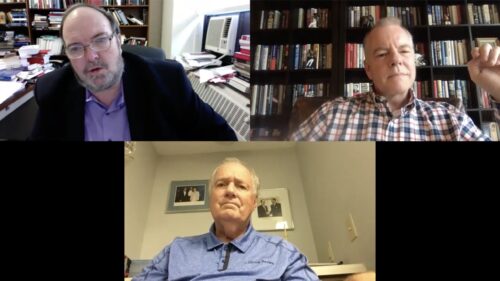A year-end collection of interesting and insightful thinking about grantmaking and giving.
(Part 1 is here.)
Ideas and advocacy, power and populism
“The great irony is that left-of-center foundations seem to believe less in the power of ideas. They’ve invested less in think tanks. They have invested more in advocacy organizations, and legal institutes, and technocratic policy development—but they have consistently underfunded intellectuals, and policy thinkers, and long-term policy work.
“A lot of progressive philanthropy is very short-term focused. Much of the funding comes in the form of project grants for specific work with near-term deadlines try to move the needle on x, y, and z issue—as opposed to understanding, as a place like the Bradley Foundation did, that this is like … What did [the Bradley Foundation’s first president] Michael Joyce used to say? This is like making fine wine. It would take years for it to really mature, and you’ve just got to be patient.
“I think that progressive funders have lacked that patience. Also, they maybe overlearned the lesson of the 1960s, which is to think that everything comes from social movements—all the change from the civil-rights movement, and the women’s movement, and the environmental movement. That didn’t give adequate weight to the power of ideas.
…
“My critique of big philanthropy is it just allows some people to be heard far more loudly and ubiquitously than others simply because they happen to be good at shorting stock or developing software. That seems problematic to me. It’s basically an extension of the critique of money in politics, but applied more broadly.
…
“[A]s a wealthy philanthropist, one should be mindful of their own outside power in the process of shaping policy, of shaping civic life, and try to exercise that power in a way that is responsible and is not overly dictating their preferences. There’s a lot of attention to shifting the norms within philanthropy, since shifting the policy, the laws, and the regulations is so difficult. Wealthy philanthropists need to be mindful of the power they possess and exercise that power responsibly.
…
“We do live in a populist moment. We live in an anti-elitist moment. We live in a moment with record economic inequality. We live in a moment, as well, where almost every sector of society, every industry has come under scrutiny for its low levels of accountability or transparency.
…
“Every sector of society has growing critiques of its power and influence. It was only a matter of time before that critique extended to philanthropy.”
— “A conversation with Inside Philanthropy editor David Callahan (Part 1 of 2),” April 22, 2020, and “A conversation with Inside Philanthropy editor David Callahan (Part 2 of 2), April 23, 2020
Christianity, charity, and politics
“Critics might say it’s hard to differentiate [Pope Francis’] vision of Christianity from the spirit of a kind of activist NGO.
…
“Most Catholics believe in the hermeneutic of continuity. That means what the Pope says has to be interpreted in light of the tradition … [Francis] seems to suggest that a deeper form of Christianity is at the level of politics. I think his predecessors would be extremely nervous about that move.”
–– “A conversation with Daniel J. Mahoney about Pope Francis’ Fratelli Tutti (Part 1 of 2),” October 19, 2020, and “A conversation with Daniel J. Mahoney about Pope Francis’ Fratelli Tutti (Part 2 of 2),” October 20, 2020

Legal and regulatory structural framework of philanthropy
“Since the so-called tea party scandal, the IRS [Internal Revenue Service] has also retreated from enforcement so they have not only less money, but also less willingness to do the job. You put that combination together and basically not much is being done now.
…
“The EO [exempt organizations] area really doesn’t have an SEC [Securities and Exchange Commission] or other government agencies really looking at it. It’s rather unique, and I don’t think it’s good that the IRS is the federal regulator of the tax-exempt sector when the IRS’s business is collecting taxes.
…
“[E]verything I hear is that the FEC [Federal Elections Commission] doesn’t work. Therefore, there’s not much to work with, because the FEC is split. For political reasons, they apparently do nothing and therefore, the IRS is left without a partner when it comes to addressing political organizations.
…
“The thing with the IRS is the people who work at the IRS are mostly accountants and tax attorneys. What do they know about social welfare, etc.? Well, that’s what exempt organization are about, so you really need a whole different mindset.
…
“Some of us think that the public has a stake in section 501(c)(3) charities because their donors get tax-deductibility, but the billionaires who set up LLCs [limited-liability corporations] aren’t asking for deductibility. So it’s hard to say that they owe us anything, although they are using DAFs [donor-advised funds] when they do want deductibility, so there is that catch.
“Basically, my position is that if you’re getting deductibility, the rest of us should have some say in how you operate. I know that doesn’t go over too well, but nevertheless there is that public subsidy issue.”
— “A conversation with EO Tax Journal editor Paul Streckfus (Part 1 of 2),” November 11, 2020, and “A conversation with EO Tax Journal editor Paul Streckfus (Part 2 of 2),” November 12, 2020
Supplanting stagnation with dynamism
“There’s this kind of stagnating effect in our society. It seems like looking at different ways to challenge that—whether through school reform, cultivating an entrepreneurial mindset in younger people, and then working with officials to make it easier to do things like starting a new business, making it easier to move reforms of the social safety-net system—all of those are areas that really need attention, that policymakers on their own right now don’t seem equipped to address. I think it’s a particularly unique place for philanthropists, people who want to invest their private resources, to try to address some of these issues.
…
“I think the amount of giving to organizations with this concern for the future of dynamism in America is sort of underserved compared to what the what the need is.
…
“Civic engagement on the left in America has always been very political.” On the right, “because of, I guess, a more-profound attachment to the notion that civil society is broader than politics—it involves private actors and involves private organizations—that just is reflected in the way” they give.
— “A conversation with the American Enterprise Institute’s Ryan Streeter (Part 1 of 2),” November 23, 2020, and “A conversation with the American Enterprise Institute’s Ryan Streeter (Part 2 of 2),” November 24, 2020


